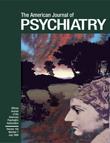Clozapine for Substance-Abusing Schizophrenic Patients
To the Editor: Substance abuse, including cocaine, is common among individuals with schizophrenia (1). While effective medications for these dual-diagnosis patients have not been established, atypical antipsychotics may hold promise. Clozapine has been reported to decrease alcohol and cocaine use in chronically psychotic patients (2). Other atypical agents may also be effective in reducing cocaine use as well (unpublished report by J.W. Tsuang et al., 1998). This report describes a patient who stopped abusing drugs when treated with clozapine.
Mr. A, a 43-year-old single white man with a 15-year history of paranoid schizophrenia and cocaine and alcohol abuse, had been hospitalized more than 20 times as a result of psychotic exacerbations concurrent with drug and alcohol abuse. He underwent multiple medication trials without any significant change. Mr. A used alcohol and cocaine intermittently, despite participating in our dual-diagnosis treatment program. Although he was medication compliant, his psychotic symptoms persisted. He was treated with clozapine, and the dose was gradually increased to 550 mg/day at bedtime. Since then, he has had no further hospital admissions. His memory has improved, and he is able to use skills from the drug-relapse classes. He has had no medication side effects, and he reports that he only has occasional psychotic symptoms. Mr. A has not used alcohol or cocaine since starting clozapine treatment, as validated by weekly urine analyses. Moreover, he claims that his cravings for drugs and alcohol have been reduced by clozapine, and when these cravings do occur, they are often easier to manage. Currently, he remains abstinent, and he is psychiatrically stable.
Mr. A’s case, and others that we have treated, suggests that clozapine may reduce substance abuse while decreasing psychotic symptoms in chronically ill schizophrenic patients. Although the reasons are uncertain, a lesser need to self-medicate psychiatric symptoms and greater insight into the negative consequences of drug use are possible explanations. Furthermore, it has been proposed that higher dopamine concentrations and additional serotonergic input are required for psychostimulant-induced euphoria (3). Sole manipulation of the dopamine system to reduce cocaine use has not been effective (3). Using clozapine to block serotonin receptors might reduce cravings and the euphoric effects of cocaine. Additionally, atypical agents are less disruptive to cognitive functions, thus enabling the use of coping skills learned during treatment. We are currently conducting trials to determine whether atypical agents are more effective for dual-diagnosis patients.
1. Regier DA, Farmer ME, Rae DS, Locke BZ, Keith SJ, Judd LL, Goodwin FK: Comorbidity of mental disorders with alcohol and other drug abuse: results from the Epidemiologic Catchment Area (ECA) study. JAMA 1990; 264:2511–2518Google Scholar
2. Albanese MJ, Khantzian EJ, Murphy SL, Green AI: Decreased substance use in chronically psychotic patients treated with clozapine (letter). Am J Psychiatry 1994; 151:780–781Medline, Google Scholar
3. Gawin FH: Cocaine addiction: psychology and neurophysiology. Science 1991; 251:1580–1586Google Scholar



